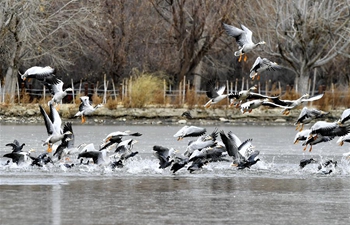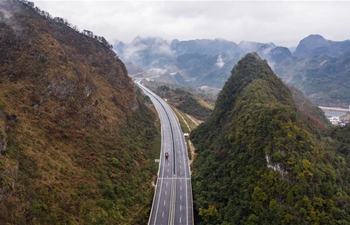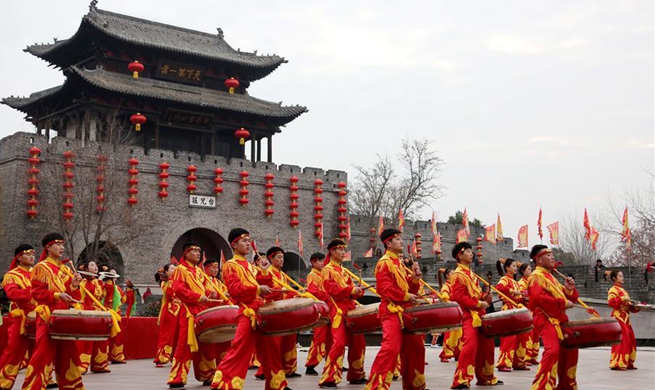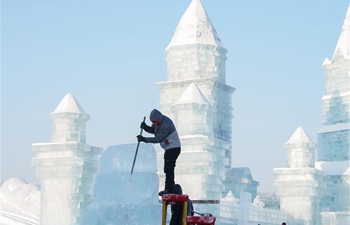by Duncan Murray
SYDNEY, Jan. 2 (Xinhua) -- Throughout the final months of 2019, Australia experienced its most destructive bushfire season ever recorded.
Between November and December in the worst hit State of New South Wales, nine people were confirmed dead, close to 1,000 homes were lost and more than 3.6 million hectares of wilderness was burnt.
In late December, another person was killed by fires in the State of South Australia, with homes, property and thousands of hectares of bushland lost there as well.
The world took note. Not least at the news that thousands of koalas had likely perished across Australia -- a shocking symbol of the toll the disaster was taking on the country as a whole.
In the new year, Australians remained on high alert and with many months of summer left to go, tensions were high as to what would happen next.
On the New Year's Eve, the crisis escalated once more, both in NSW and the neighbouring State of Victoria.
With soaring winds and temperatures fanning flames, thousands of people fled to the coast, taking shelter on beaches where they felt the safest.
Several rural towns were badly hit and residents could do little but try to escape as flames consumed entire communities. NSW Rural Fire Service Commissioner Shane Fitzsimmons confirmed that 382 homes were destroyed.
Around 50 homes were also confirmed to have been lost in Victoria -- a number expected to significantly increase as assessment crews further accessed affected areas.
Already the total number of homes destroyed by bushfires this season is over 1400.
Rather than popping champagne, many Australians spent the last day of the decade in fear for their lives. The town of Batemans Bay became cut off by fires and residents were forced to spend the night by the water surrounded by fire.
As the new year dawned, five more people were confirmed dead in southern NSW. They had either been trying to defend their homes, or flee the vicious inferno.
In Victoria's East Gippsland region, another person was found dead at home, taking the overall death toll this season to 17.
Images emerged on social media of residents escaping by boat against a deep red daytime sky, and again the world was shocked by the severity of the fires.
Military ships and helicopters were called in to rescue those still stranded near the ocean, including at the popular holiday destination of Mallacoota beach, where an estimated 4,000 people had taken shelter.
Late on Wednesday evening, NSW RFS issued an order for tourists to vacate a roughly 250 kilometre stretch of the NSW South Coast, another popular summer getaway, and by Thursday morning giant queues had formed of those trying to access fuel, food and water in order to make their way home.
Prime Minister Scott Morrison urged calm and patience from those caught up in the disaster and insisted that everything possible was being done to make the evacuation process as smooth as possible.
"We cannot control the natural disaster but what we can do is control our response," Morrison said.
"What we can do is support those who are out there putting themselves at risk by showing the patience and the calm that is necessary."
However, not everybody could be reached. Scorched infrastructure meant that in many places phone and internet services were down, restricting normal lines of communication.
Amid the confusion, 17 people were declared missing throughout Victoria's remote East Gippsland Region with serious concerns for their safety.
"These are very challenging circumstances and unique in many ways to have this many people cut off from services is not something we would normally experience," Victorian Premier Daniel Andrews told reporters.
"We do hold very significant fears for the welfare of anybody who is missing at this time."
A combined 500,000 hectares have been burnt across East Gippsland. The result of three major fires which merged.
Nationwide, almost 5.9 million hectares have been burnt since the crisis began.
While conditions offered some reprieve on Wednesday and Thursday, forecasts were predicting a return of extreme fire danger by the end of the week.
"Fire dangers on Saturday will reach severe to extreme yet again across fire sites and communities that have already seen large scale devastation," Bureau of Meteorology scientist Jonathan How said.
"As the heat and wind returns, so does the danger."













